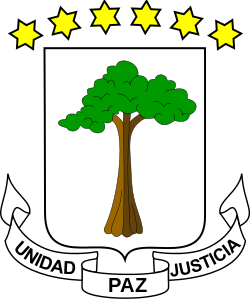Equatorial Guinean legislative election, 2013
 |
| This article is part of a series on the politics and government of Equatorial Guinea |
| Administrative divisions (provinces) |
|
Legislative elections were held in Equatorial Guinea on 26 May 2013, alongside local elections. Following constitutional reforms approved in a 2011 referendum, they were the first elections in which the newly established Senate is elected.[1] The ruling Democratic Party of Equatorial Guinea won all but one seat in both houses of Parliament.
Electoral system
The Senate has 70 members, of which 55 were elected and 15 were to be appointed by President Teodoro Obiang Nguema Mbasogo.[2]
The 100 members of the Chamber of People's Representatives were elected by closed list proportional representation in multi-member constituencies.[3]
Results
Senate
| Party | Votes | % | Seats |
|---|---|---|---|
| Democratic Party of Equatorial Guinea | 54 | ||
| Convergence for Social Democracy | 1 | ||
| Appointed members | – | – | 15 |
| Total | 70 | ||
| Source: Government of Equatorial Guinea | |||
Chamber of People's Representatives
| Party | Votes | % | Seats | +/– |
|---|---|---|---|---|
| Democratic Party of Equatorial Guinea | 99 | 0 | ||
| Convergence for Social Democracy | 1 | 0 | ||
| Total | 100 | 0 | ||
| Source: Government of Equatorial Guinea | ||||
References
- ↑ Equatorial Guinea to put key reforms in place at May elections The Nation, 23 January 2013
- ↑ Election Profile IFES
- ↑ Electoral System IPU
This article is issued from
Wikipedia.
The text is licensed under Creative Commons - Attribution - Sharealike.
Additional terms may apply for the media files.